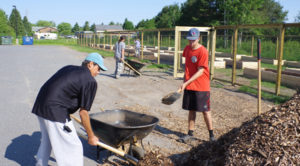Garden project cultivates opportunity and healthy community

By Rick Garrick
THUNDER BAY—Fort William’s Jensen Morriseau and Beau Boucher are working with Roots to Harvest on the Fort William community garden and two other community gardens in Thunder Bay.
“It’s a good way to give back to the community,” says Morriseau, a Roots to Harvest employee. “You learn how to garden; it’s really good. It saves you money in the long run.”
Morriseau says it was labour intensive to set up the Fort William community garden as they had to build garden boxes with lumber and fill them with about a foot-and-a-half of soil.
“We shovelled dirt for about two weeks,” Morriseau says. “It was alright. It was a good workout, you get healthy and get paid at the same time.”
Morriseau says there has been a good response to the community garden from community members.
“They say it’s great that you’re giving back to the community,” Morriseau says. “It’s a good learning process.”
Beau Boucher, also a Roots to Harvest employee, has been enjoying his experience with developing the community gardens and growing food.
“We’ve been developing some land in Port Arthur (the north side of Thunder Bay) for growing vegetables,” Boucher says. “And out here on Fort William First Nation, we are building the garden boxes also to grow vegetables.”
Boucher says some Fort William community members helped set up the garden boxes.
“We had some volunteers come and help us with shovelling some dirt and taking out the sod,” Boucher says. “Lots of people say they are going to come and check it out, but we’re not here all the time.”
The Roots to Harvest staff usually work at the Fort William site on Tuesdays and Thursdays. They have planted a variety of vegetables in the Fort William garden boxes, including corn, beets, tomatoes, peppers, peas, beans, and cabbage.
“We are going to be able to produce a lot of food,” Boucher says. “And they are setting us up with the right knowledge to do it.”
The Roots to Harvest staff recently covered the ground between the vegetable boxes with a liner and wood chips to help prevent weeds from growing at the community garden site.
“It’s enjoyable work,” Boucher says. “I’m excited for our other project where we have our bee farm going up.”
The Roots to Harvest staff built a six-foot high wattle fence made out of willow they harvested from the land to protect four beehives that were installed at one of the Thunder Bay locations on June 24. The beehives, which contain honey bees from New Zealand, were installed to pollinate the plants in the garden as well as in other gardens in the neighbourhood. The wattle fence also keeps the honey bees away from people by encouraging them to fly up and above the fence at about 12-feet high.
Seven young adult First Nations staff were hired by Roots to Harvest to work on the community garden projects over the summer as part of a five-month employment training initiative.
“These [staff] are participating at a really exciting time because they are developing from the ground up the garden spaces at Fort William First Nation and [in Thunder Bay],” says Kim McGibbon, Roots to Harvest’s program coordinator.
“They had an opportunity to learn how to build these raised beds. They are learning to plant the foods; they are learning to care for the foods and they learned how to build a greenhouse and what it means to grow food in a greenhouse versus growing food outside,” added McGibbon.

